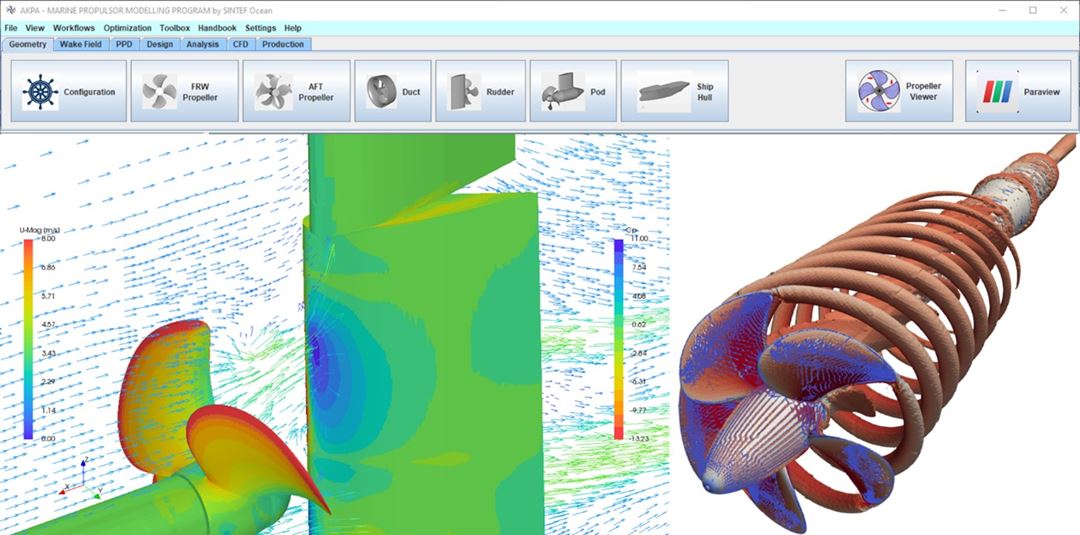Six industrial companies in Norway, delivering propulsion systems, have joined forces with two research partners to develop the next generation propulsion design and analysis tool for industrial use. This tool incorporates the traditional calculation approaches for early-phase design tasks as well as viscous flow methods for advanced simulations for a range of different propulsion systems under different operation conditions. This will enable more reliable prediction of the performances of different propulsion systems.
The project will extend existing flow analysis tools for propulsion analyses with modelling of viscous flow at full-scale using Computation Fluid Dynamics. This will be a step beyond the current state-of-the-art in the inclusion of CFD in industrial design of marine propulsors. Verification and validation as regard computational mesh, turbulence model and multiphase model are of paramount importance. The development involves the use of an open source CFD library and development of automated simulation setups customized to specific simulation scenarios.
Background
With continuously increasing requirements regarding low-cost and environment friendly deliveries, the maritime industry is facing ever more stringent market demands for the accurate prognosis and good documentation of efficiency, reliability, cavitation, vibration and noise characteristics of propulsion systems covering the whole vessel operation profile, not only design conditions. The existing numerical methods for propeller calculations, which are based on systematic data and potential flow theory, proved to be a robust tool for routine tasks performed at the early stages of propeller design. However, the design of a modern propulsion system is seldom limited to one operational point.
The historic targets set up by IMO in 2018 regarding decarbonization of shipping and increasingly demanding requirements put forward by the European community and national authorities regarding the efficiency and environment friendliness of marine propulsors call for more accurate methods used in propulsor design. Such methods need to be representative of actual flow physics and they need to enable evaluation of propulsor characteristics in as wide range of operation conditions as possible. The advanced numerical tools developed in the project will contribute to the digitalization of the design and production phases of the product life cycle, facilitate innovation in products and enhance companies' productivity.
Objectives
The principal vision and goal of the project is to increase growth, robustness and value creation in the marine propulsion industry of Norway by means of more accurate and efficient tools for the design, optimization and documentation of performance of propulsion and maneuvering systems.
Numerically, this goal can only be adequately achieved by implementing methods of viscous flow theory, and more specifically, CFD. The main result of the project is the next generation propeller design and analysis tool of industrial use that incorporates both the traditional calculation approaches for early-phase design tasks and high-fidelity viscous flow methods for the advanced simulations of the product under different operation conditions. The parametric model and workflow functionality implemented in the new GUI will allow the users to perform custom design optimization of propulsors and enable design exploration studies at a system level. Continuous cooperation between the industrial and research partners in the project will secure mutual knowledge exchange and sustainable development of methods available for marine propulsion industry, thus contributing to more efficient, reliable and environment-oriented deliveries.
The use of innovative numerical tools developed in the project will result in better optimized, more thoroughly documented and hence more competitive products, which will strengthen the market position of participating companies and create new opportunities on both the national and international arenas.
Method validation will be performed against experimental databases, and by comparisons with commercial CFD codes. Customization and automation of simulation setups will greatly reduce time, costs and user errors for the industrial users.


